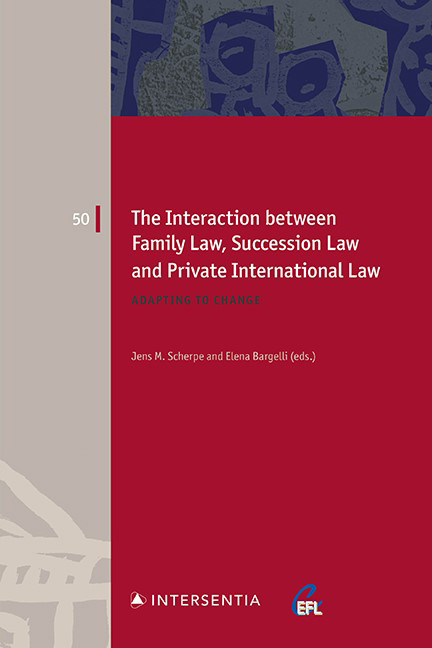Book contents
- Frontmatter
- Acknowledgements
- Contents
- List of Cases
- List of Contributors
- The Interaction between Family Law, Succession Law and Private International Law: An Introduction
- PART I THE IMPACT OF DEVELOPMENTS IN NATIONAL FAMILY LAWS ON EU PRIVATE INTERNATIONAL LAW
- PART II THE IMPACT OF EU PRIVATE INTERNATIONAL LAW ON NATIONAL FAMILY LAWS
- PART III THE IMPACT OF NATIONAL SUCCESSION LAWS ON EU PRIVATE INTERNATIONAL LAW
- PART IV THE IMPACT OF EU PRIVATE INTERNATIONAL LAW ON NATIONAL SUCCESSION LAWS
- Index
- European Family Law Series
Cross-Border (Non-)Recognition of Marriage and Registered Partnership: Free Movement and EU Private International Law
Published online by Cambridge University Press: 25 May 2021
- Frontmatter
- Acknowledgements
- Contents
- List of Cases
- List of Contributors
- The Interaction between Family Law, Succession Law and Private International Law: An Introduction
- PART I THE IMPACT OF DEVELOPMENTS IN NATIONAL FAMILY LAWS ON EU PRIVATE INTERNATIONAL LAW
- PART II THE IMPACT OF EU PRIVATE INTERNATIONAL LAW ON NATIONAL FAMILY LAWS
- PART III THE IMPACT OF NATIONAL SUCCESSION LAWS ON EU PRIVATE INTERNATIONAL LAW
- PART IV THE IMPACT OF EU PRIVATE INTERNATIONAL LAW ON NATIONAL SUCCESSION LAWS
- Index
- European Family Law Series
Summary
INTRODUCTION
The past 20 years have seen an increased fragmentation of national laws on the formalisation of adult relationships within the EU. Gender restrictions on marriage have been abandoned in 13 Member States, but have been retained in the other 14. Registered partnership has emerged as an alternative method of formalisation in many (but not all) Member States. Where registered partnership has been introduced across the EU, it has taken many different forms: gendered versus non-gendered; ‘marriage-like‘ versus ‘marriage lite‘ ; transitional (as a prelude to marriage equality) versus permanent. Thus, while the European Court of Human Rights (ECtHR) has been exerting some (gentle) pressure towards harmonisation and towards a right of formalisation for samesex couples under Article 8 of the European Convention on Human Rights (ECHR), national laws remain extremely diverse.
Also, at the level of cross-border recognition, there is considerable heterogeneity across the domestic laws of Member States. Same-sex marriage may be recognised in another Member State as registered partnership, or as marriage, or not at all. Same-sex registered partners may also encounter problems of non-recognition not only in those Member States where there is a reluctance to formalise same-sex relationships, but also in Member States where registered partnership has been discontinued in conjunction with an extension of marriage to same-sex couples. Insofar as different-sex registered partnerships are unknown in many parts of the EU, these couples are also particularly likely to face a status vacuum where they move from one Member State to another. These complexities are compounded by uncertainty as to the role (if any) of the personal (national) law of the parties.
This diversity (and uncertainty) has the potential to undermine the EU‘s free movement agenda insofar as non-recognition (and uncertain recognition) of status may inhibit personal mobility. The Court of Justice of the European Union (CJEU) has repeatedly shown a willingness to deploy a ‘negative integration‘strategy (based on Articles 18 and 21 of the Treaty on the Functioning of the European Union (TFEU)) in tackling the consequences of diversity in national naming laws by eliminating restrictions on cross-border surname recognition, and for many years, it has been suggested that this doctrine was logically applicable to other situations of ‘limping status ‘, including marriage recognition.
- Type
- Chapter
- Information
- The Interaction between Family Law, Succession Law and Private International LawAdapting to Change, pp. 13 - 34Publisher: IntersentiaPrint publication year: 2021



